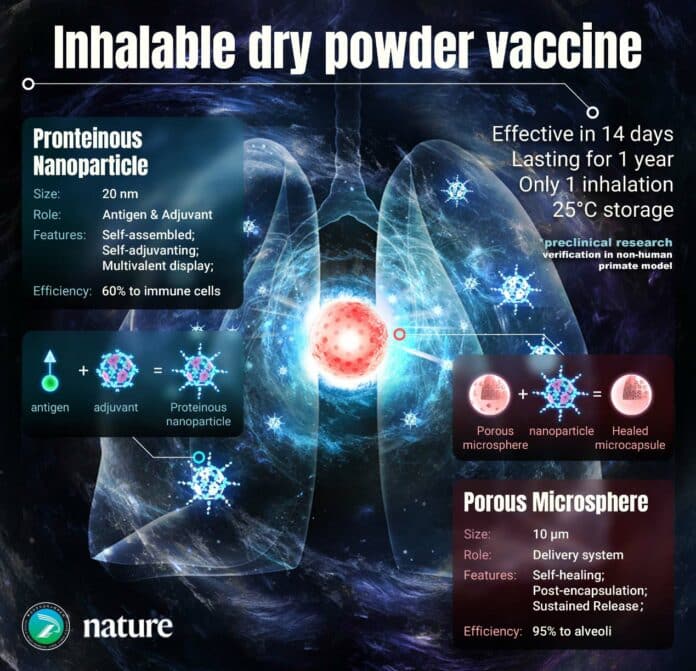The COVID-19 pandemic has fostered significant advances in vaccination technologies. However, there are urgent need for vaccines that induce mucosal immune responses and for single-dose, non-invasive administration.
Scientists from the Institute of Process Engineering (IPE) of the Chinese Academy of Sciences have developed a new “nano-micro composite” delivery concept for vaccines. They created a promising vaccine approach: a single-dose, dry powder, inhalable vaccine using nano-micro composite multilevel structures. This vaccine has been made in the lab and has proven effective in preventing respiratory viral infection and transmission in animal models.
This approach shows potential for fighting future infectious diseases that may emerge or become epidemics.
This new platform combines protein nanoparticle-loaded biodegradable microspheres. These nanoparticles’ surfaces can exhibit several antigens at once, triggering a broad-spectrum immune response and extending the reach of vaccine protection. Because of the versatility of antigen presentation, it also makes the generation of additional respiratory virus vaccines simple and easy.
Furthermore, by enabling high-performance delivery, the platform’s distinctive nano-micro composite structure promotes an effective immune response in the lungs. Antigen-presenting cells can effectively absorb the produced antigen-nanoparticles.
Furthermore, this dry powder vaccine significantly reduces transportation and storage expenses, making it appropriate for locations with inadequate refrigeration facilities and increasing vaccination rates.
Additionally, with just one inhalation, the vaccine’s continuous release of antigens produces long-lasting humoral, cellular, and mucosal immunity. Later, in collaboration with Prof. HE Zhanlong of the Chinese Academy of Medical Sciences’ Institute of Medical Biology, the scientists created a model that outlined the advantages of inhaled vaccination for preventing viral infection and transmission. This model was named airborne protection, close contact protection, and airborne transmission blocking.
Prof. WEI Wei said, “The components of this nano-micro system used natural proteins and approved polymer materials, and the effectiveness and safety of the vaccine have been systematically studied in non-human primates, indicating its great potential for clinical translation.”
Journal Reference:
- Ye, T., Jiao, Z., Li, X. et al. Inhaled SARS-CoV-2 vaccine for single-dose dry powder aerosol immunization. Nature (2023). DOI: 10.1038/s41586-023-06809-8
